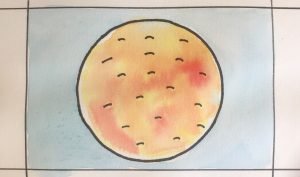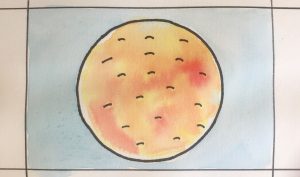At the beginning of each new semester when I taught English 101 at UNM in Taos, New Mexico, I would draw a huge circle on the front board, while the semicircle of first-year students sat and stared.
“This is the world,” I’d say, patting the circle. “And these –” I quickly marked the circle with lots of short, horizontal dashes “— are problems in the world. As I see it, our job as individuals – our personal purpose – is to seek out one of those little negatives and turn it into a positive, using all the intelligence, talents, heart and soul we’ve been given.”
I scanned the room to read the students’ reactions. Their faces looked blank — what we used to call “subway faces” in New York — registering nothing, neither acceptance nor rejection, neither positive nor negative.
“Maybe you’re wondering what all this –” I patted the circle on the board again “– has to do with English 101,” I’d say. I knew many of my students were the first in their families to attend college, even this two-year community college; many were Hispanic, and English had never been their favorite subject in school.
“To succeed in life, as human beings and responsible citizens of the world, to fulfill our purpose and reach our personal goals, I strongly believe, we must first become educated. We must learn how to think like never before. This is why college and university is called ‘higher education.’ It’s here in college where we learn critical thinking. Not how to be critical but how to really think. Thinking is critically important.”
Again, I studied faces. Some were quizzical. Some looked skeptical. I pressed on.
“So how exactly do we learn how to think? And how do we show, or prove, what we’ve been thinking? In this course we’ll approach this by doing a lot of reading, speaking, writing, and sharing. We’ll do all this in English, because that happens to be the official language of this country. If we were in Mexico, we’d use Spanish, or if we were in France, we’d use French. Language is just a tool for expressing our thoughts, and English is just one of the world’s many languages.”
I was an adjunct instructor at UNM for ten years, and all together in those years I had about a thousand students. Whether or not my little introductory pep talks made any difference for any of my students in the long run, I’ll never know. But I do know that it seemed easier to talk with young people then about “purpose” than it is to bring up the subject with older people now.
Why is this, I wonder? Have we in la tercera edad (the third age, or stage, of life) given up? Do we feel we’ve served our purpose and there’s not much more for us to do? (Due, perhaps, to the endemic ageism in the American culture?) Has retirement from the corporate world – or seeing our children go off into the world – left us with a sense of purposeless now?
Looking back, I know there have been many times in my life when I’ve had a strong sense of purpose, which made me deeply happy. Serving in the Peace Corps was one time. Teaching at UNM was another. Neither of these pursuits paid well; as a Peace Corps volunteer I got a small monthly living allowance, and as an adjunct college instructor, I earned pittance. Clearly, the remuneration for meaningful purposes is not necessarily in dinero.
I’ve been grappling more than ever before lately with the concept of purpose, and I like to think I’m not alone in this. What is the work that we older people are charged to do in this crazy, mixed-up world (So many negative marks on that big circle!), while we still have time on this earth to do it? And, speaking personally, what more should I be doing now? It seems to me this issue deserves some serious – yes, critical – thinking.
As ever in my life, I’ve looked to books for guidance. I recently found and read several short, helpful how-to’s on the subject of finding one’s purpose. The most practical and useful of these in my opinion was LIVE YOUR PASSION, FIND YOUR PURPOSE, by S. Degnan (2023), filled with helpful lists and workbook-like exercises.
In it Degnan writes: “Recognizing your passions is an ongoing journey of self-discovery, a continuous process of self-awareness and exploration that leads to a life filled with meaning, joy, and a sense of purpose.”
This week a friend shared with me an interview she’d viewed recently with the eminent journalist Christiane Amanpour in which Amanpour talks about the importance of purpose. “You must have a dream,” Amanpour says. “You must have a sense of purpose. You must want to do something that is really worthwhile in the world in which we live.”
This sense, this drive, I believe, must be timeless.
I’d love to hear from you. Are you seeking purpose too? If so, how, and where? Have you found your later-in-life purpose? If so, what is it, and what does it mean to you? I invite you to contribute to the conversation in the Comments section for everyone’s benefit. Muchisimas gracias!
~ ~ ~ ~ ~ ~ ~ ~ ~ ~ ~
- Here is the July 14, 2023, interview with Christiane Amanpour in which she speaks about purpose: https://www.youtube.com/watch?v=gWG1tKKyjg0&t=2512s
- And here are two previous WOW posts on the subject of purpose:
www.blog.bonnieleeblack.com/on-purpose/ and
www.blog.bonnieleeblack.com/debbie-weil-on-purpose/


